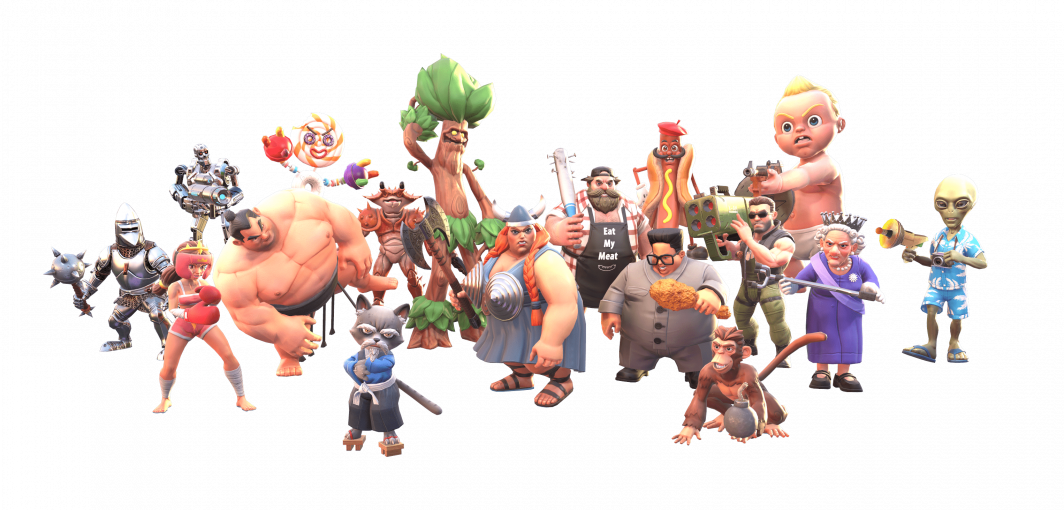It’s been said that bigger is better. But, when it comes to gaming studios—which Ernst & Young predicts will generate an estimated $211 billion in global revenue by 2025—there is room for both, at least according to the founders of one independent cross-platform games studio.
Robot Squid develops and publishes real-time multiplayer games. At its core is a belief that the most memorable gaming experiences—those that create a lasting relationship with players—are the lovingly created games crafted by small teams of passionate developers. Robot Squid’s mission is to deliver original, innovative, and accessible multiplayer games for everyone. This belief and mission were forged from the experiences of the founding leadership team.
Robot Squid co-founder Tobias Barendt started his career in the gaming industry more than 20 years ago at the Stockholm-based startup Grin AB. When he got the opportunity to experience working for Sony’s London studio in the console space, he jumped at the chance to experience life at a large gaming company. He later took a similar role at Microsoft.
As mobile gaming gained traction, the excitement of building games for this emerging technology—and an itch to rejoin the startup environment—drew him to Future Games of London.
“We grew Future Games of London under Ubisoft to be quite a big company,” said Tobi. “I learned that working on a third-party game would take three or four years to develop, get people to play it, and give feedback. When the iPhone came out, getting that feedback really quickly became possible.”
The Future Games team, including his soon-to-be partner Chris Dawson, built an impressive success record partly due to the wildly popular Hungry Shark game. This success drew the attention of Ubisoft, which acquired Future Games in 2013. Tobias and Chris stayed with Ubisoft, but they soon heard the call to return to the startup life with its energy, creativity, and challenges.
“Mobile changed the whole process of game development,” continued Tobi. “We wanted to return to our roots and get more involved in product again instead of management. I wanted to work with a smaller team of programmers and be directly involved in product development, so we decided to start something new.”

Off to the Pub for Inspiration
So, Tobi and Chris set off for the place where startup lore is often born: the pub.
The two founders brainstormed multiplayer game ideas over pints. The new game category was quickly gaining in popularity. Inspiration struck, and the King of Crabs game was born, as was the Robot Squid name, inspired by the beer they were enjoying.
Tobi and Chris joined forces with another Ubisoft veteran, Jason Williams, who joined as COO of Robot Squid. Jason had been a lifelong gamer and brought valuable finance, user acquisition, and project management skills to the leadership team. “A large gaming company like Ubisoft is a great place to learn, but the opportunity to work with former colleagues in a startup was an easy ‘yes.'”
This leadership team sees room in the industry for both big and small gaming studios. Large studios with bigger budgets and teams creating more content can offer more global reach and security for their employees. Small studios have the agility to engage with users and develop faster.
The Right Cloud for the Game
When it comes to the choice of cloud infrastructure, larger studios are more likely to have a hybrid strategy that is very protective of its technology and IP. At small studios like Robot Squid, the focus is on the product and what’s best for the users.
The team evaluated several cloud providers, searching for reliability and ease of use. Akamai’s cloud computing services (formerly Linode) stood out immediately, offering the proper dedicated CPU instances required for gaming. The second consideration that made Akamai stand out was pricing. Robot Squid knew it would be cheap and easy to start with Amazon or Google. But once they were ready to scale, the cost would increase exponentially.
“The bandwidth costs to run King of Crabs on AWS would be 100 times more than what we pay on Akamai. So, transparent pricing with no surprises was definitely a plus. Other providers had similar pricing, but the data center locations, dedicated CPUs, and great customer support made Akamai the best choice for us.”
Robot Squid does use AWS to deliver some content to users, Amazon S3 for storage, and managed MongoDB is run on AWS as well. But Tobias and his team continue to try different offerings from Akamai. With the development of their most recent game, Big Fat Battle, they’re using Linode Kubernetes Engine (LKE) for managed Kubernetes, which they’ve discovered is simple and hassle-free without risking platform-native lock-in.
In partnership with Akamai, the Robot Squid leadership team has rediscovered the power and excitement of startup life. “Small teams of talented people working well together can really craft unique and memorable gaming experiences,” Jason said. “The vision for Robot Squid is always to create multiplayer experiences that are truly accessible for as broad an audience as possible. Focussed on quality, we continue to lean into the fun and humor of the games we’re known for, and Akamai is helping us deliver the kinds of experiences to our users that drew us back to startup life in the first place.“







